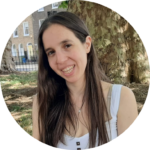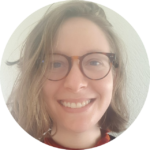YIDDISHE SPHRAKHN ARUM DER VELT
ON ONE FOOT
The Rimon Festival of Jewish Languages was a celebration of the beauty and diversity of languages used by Jewish communities around the world – including Yiddish, Hebrew, Ladino, and more.
THE WHOLE MEGILLAH
The Jewish Language Diversity Seminar is the brainchild of a pair of NGF Network members, Tamara Gleason and Talia Margolis, who share a love of the Yiddish language. These two women met and bonded over their shared passion for Yiddish at the Idishe Shtub in Mexico City and furthered their vision at the 2016 Regional Latin American NGF in Cuba.
After many years of running activities aimed at bringing people together around the Yiddish language, Tamara and Talia wanted to build a global network of people interested in Yiddish and other Jewish languages.
The first Seminars took place in the homes of participants in 10 countries around the world. They included the history of Yiddish, discussions of its unique components and characteristics, and opportunities to engage in a Yiddish-Talk language lab where participants could practice their Yiddish skills.
However, during the pandemic, the Seminar expanded to become a robust, worldwide online series of events, including The Rimon Festival of Jewish Languages, two Shmues Krayzn (Talking Circles), and a book presentation with the Jewish Ashkenazi Community in Mexico. The Festival of Jewish Languages ran from November 14 – December 12, 2021, and included individual sessions in Yiddish, Ladino, Judeo-Arabic, Buxorī/Judeo-Tajik, and Hebrew.
The project ended with a book presentation with the Jewish Ashkenazi Community in Mexico about Ilan Stavans’ book’s translation into Yiddish. Members from the Jewish community attended the event and enjoyed the conversation between Beruriah Wiegand and Ilan Stavans.
“The festival on Jewish languages gave me the rare chance to learn of little-known Jewish languages and cultures,” participant David Salem said. “I especially valued the opportunity to listen to short lectures from top scholars.”
“I have been studying Yiddish through Duolingo and this was the first time I could put my knowledge into practice,” said another participant, Masha Budryte. “It is quite hard to practice spoken Yiddish without making a huge commitment and shmues krayzn provides a nice way to do that.”
The Seminar, Festival, and surrounding events created a unique transnational platform for members of different communities to learn about Jewish languages and celebrate diversity across and within Jewish cultures.
ABOUT THE GRANTEES

Tamara Gleason
United Kingdom
Tamara Gleason Freidberg is an historian (MPhil by UNAM, Mexico) and a gerontologist (MSc by King’s College London). Her work includes publications on Mexican Yiddish literature and the Jewish Left in Mexico. Tamara facilitates Yiddish sessions at the Holocaust Survivor’s Centre, is an active organizer of the Yiddish Open Mic (London) and Yiddish House London. As a PhD candidate at UCL London, she currently studies the Yiddish press in Mexico, its sources and its unique role in the communication of news about the Holocaust as it developed. She is the author of Di Shvue, los bundistas en México y su participación en la comunidad judía.
Tamara is an alumna of the Latin American Regional NGF that took place in Cuba in 2016.

Talia Margolis Chomstein
Mexico
Talia Margolis Chomstein has been a Yiddish enthusiast since 1995. She started learning Yiddish in her grandparents’ house and then at a Jewish school in Mexico. When she finished her Bachelor’s Degree (Business Communication), she decided to learn more about Yiddish from an academic perspective and took some courses in Mexico and the USA. At the same time, she was working in the Kehila Ashkenazi Community Center organizing and cataloging donated Yiddish books. After that, a recognized historian in Mexico, Enrique Krauze, asked her to do the same with his collection of Yiddish books and documents from his family. Right now, Talia is working in the business industry, but in her spare time, she loves to work on Yiddish projects.
Talia is an alumna of NGF 27 in Israel and NGF Cuba and the on-site coordinator for NGF 28 in Mexico.
PROGRAM GOALS
- To create a global network of people interested in Jewish languages
- To offer participants access to knowledge and further education in Jewish languages
- To expose participants to top scholars
HIGHLIGHTS
The Rimon Festival of Jewish Languages
- 80 participants from 10 countries
- 5 sessions – 5 Jewish languages featured







